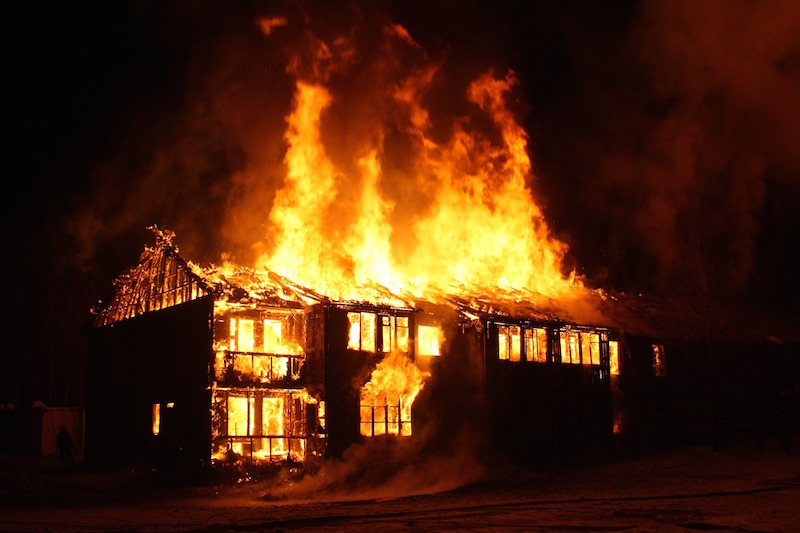According to Which?, white goods, like washing machines, cause more than 60 fires every week in the UK. With memories of Grenfell still fresh in our minds, it’s a reminder of the importance of landlord fire safety. If you’re a landlord, read on to find out what you can do to protect your property and tenants from the risk of fire.
1) First, what responsibilities do landlords have for fire safety?
Fire safety regulations for rented properties are laid out in a number of acts and regulations:
- The Housing Act 2004
- Furniture and Furnishings (Fire Safety) Regulations
- The Regulatory Reform (Fire Safety) Order
- Smoke and Carbon Monoxide Alarm (England) Regulations 2015
- Building Regulations
If anything does happen, you’ll need to be able to prove that you did everything that could reasonably be expected to protect your tenant. That means taking steps to make sure that you have done what you can to prevent a fire from occurring. It’s also important to have systems in place to show you have ensured that your tenant knows what to do and can get out quickly if a fire does occur.
2) Does your property contain high-risk household appliances?
Even if you rent your property unfurnished, many landlords do still provide white goods, such as a cooker or fridge, especially if these are integrated within the kitchen units. Consequently, you are responsible for these items and their safety.
The research carried out by Which? found that faulty washing machines and tumble dryers presented the highest risk of fire. These appliances caused more than a third of fires (35%) between 1 April 2014 and 31 March 2016. Other high-risk appliances for the same period include cookers and ovens (11%), dishwashers (10%) and fridges, freezers and fridge freezers (8%).
Whirlpool, which includes the Hotpoint, Indesit, and Creda brands, has been named the manufacturer most likely to result in fires. One of the problems appears to be that the materials used as the backing are not always flame retardant. You can check this list of models to see if your appliances have a flame-retardant backing.
3) Checking white goods for safety
It’s important to regularly check any white goods to ensure they are in a good state of repair. Keeping them clean is also important. Pull them out from their place to make sure you can clean away all the dust and fluff trapped behind them or in motor vents, which could potentially ignite if an electrical fault did cause a spark.
Other essential landlord fire safety checks
4) Is signage in good order?
If the property you let is a block of flats, it’s recommended that you put fire action signs inside the front doors or in the corridors, informing residents what to do in the case of fire. Make sure you check these signs to ensure they can still be clearly read.
5) Smoke alarms
Smoke alarms must be fitted in any property you rent out. But do you have a process in place to make sure they are regularly tested? Even if you have a mains operated system, it’s important that you regularly check that the battery back-up is still functioning, just in case there is a fire when the mains power is not working.
6) Are exits accessible?
Have you checked that all doors to the outside be opened easily? Make sure they can be opened quickly and easily, and are not blocked. A lock that can quickly be flicked from the inside is best, as spare keys can sometimes get misplaced. You also need to make sure that passages to these fire exits are kept free of clutter.
7) Preventing arson
Arson is another major fire hazard for landlords to be aware of. There are simple steps you can take to help minimise your risk of being the victim of an attack. Bins are often the location of arson attacks. So, keep bin areas tidy and don’t leave combustible materials in the bin or the bin area. If possible, lock the bins away so only your residents can access them.
8) Finally, check that you have appropriate financial protection from fire
Even if you take steps to limit the risk of fire in your property, accidents and arson attacks can happen. As a result, you need to protect your investment with robust landlord insurance.
What does landlord insurance include?
Your landlord or buy-to-let insurance can be tailored to cover you for the things that you feel are most important. This could include:
- Building insurance – This is the most basic level of landlord insurance cover, and will pay out in the event of damage to the physical building itself. For example, there is a fire.
- Landlord’s content insurance – If you are offering a fully furnished house or flat for rent then you need to protect your furniture and other items from damage that may occur by accident or as a result of your tenants’ actions.
- Legal protection – This will protect you in the event that legal proceedings are brought against you by a tenant.
- Loss of rent insurance – If your property is damaged or you can’t live in it for a period of time, you stand to lose a considerable amount of rental income. Landlord insurance can cover you for these periods so that you’re not out of pocket.
Getting a great value quote on quality landlord insurance
Talk to our specialist landlord insurance team at Park insurance. We understand the specific needs of landlords, whether you let out one residential flat or have a large portfolio. We combine our knowledge of the rental market with our deep understanding of insurance to find you high-quality insurance products at great value prices. Call our expert team today on 0117 9556835 or get in touch for a free quote.

